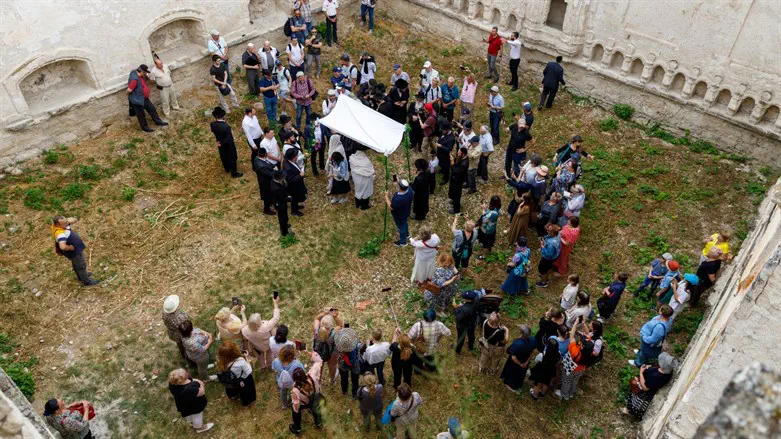
278 years after his death, the grave of Rabbi Shabtai, a disciple of the Baal Shem Tov, became a place for Jewish people to pray. Dozens of Jewish refugees from Ukraine participated in the pilgrimage to his grave in the town of Rashkov in the region of Transnistria. For the first time since the Holocaust, a strictly Jewish wedding was held at the site.
The town of Rashkov has not seen such a celebration for almost 100 years. The groom, who is from the Jewish community in Chisinau, and the bride, a Jewish refugee from Ukraine who settled in the Jewish community in Chisinau, were granted the opportunity to build a new Jewish household. Rabbi Pinchas Salzman of Moldova officiated at the marriage, in the presence of dozens of Jews from Israel and around the world who participated in the pilgrimage to mark the p[assing of the Kabbalistic Rabbi Shabtai of Rashkov.
The town of Rashkov is in Transnistria, an independent region in Moldova that is controlled by Russia and is not recognized as an independent entity by most countries of the world.
A group of about 100 refugees from Ukraine who are staying in Moldova who came to pray at the grave of Rabbi Shabtai joined the wedding as well.
The new couple and refugees were part of a group of over a hundred Jews from Israel, Moldova and the world, alongside local Jews who went to the grave of Rabbi Shabati, one of the greatest disciples of the Baal Shem Tov, who died 278 years ago and was known as a kabbalist and miracle worker.
The trip was organized by the Jewish community in Moldova led by the country's chief rabbi, Rabbi Pinchas Salzman. This is the second year in a row that a trip like this has been arranged to visit the sage’s grave, after the site was located last year by Rabbi Salzman and members of the local community.
Among the refugees who were rescued from Ukraine by Rabbi Yitzhak Halfon, chairman of the 'Wings of Faith' organization were also many from the city of Kherson and the villages who described the destruction of their homes following the explosion of the dam. The entry of the refugees from Ukraine into the Russian region required prior approval, but after a series of delays at the border between Moldova and Transnistria, most of the refugees from Ukraine were allowed to enter the pro-Russian territory.
"We came to pray at the grave, because they destroyed our house. Now we have nowhere to return, only prayers will help us" said Valeria, one of the refugees, a resident of the city of Kherson. Valeria, like dozens of refugees who participated in the journey to the sage's grave in the town of Rashkov, lives in a hotel in Chisinau and is supported by the local Jewish community.
"The refugees who went to the grave of Rabbi Shabtai were crying their hearts out in a prayer that they would be allowed to return to their homes and that the war and the bloodshed would soon end," said Rabbi Salzman.
The pilgrimage to the town of Rashkov, began with learning and spiritual meditation in the Jewish community in Chisinau. During the journey, the people prayed at the graves of other sages in the country, including Rabbi Yehuda Leib Tzirlzon, Rabbi Mendel of Bar, as well as at the mass graves of Jews who were murdered by the Nazis in the Holocaust in Transnistria.
According to the chief rabbi of Moldova, Rabbi Pinchas Salzman: "When you walk in the towns of Transnistria, you feel in the air the power of the Jewish history that were alive here before the terrible Holocaust. Everywhere you can witness buildings and cemeteries that are filled with evidence of a wealth of Jewish communities. The Jewish community in Moldova took upon itself the responsibility of reviving history and preserving the great heritage in the of Rabbi Shabatai and others. In recent years, we have seen the flourishing and strengthening of the communities throughout the region, and especially in Tirspol, the capital of Transnistria".

